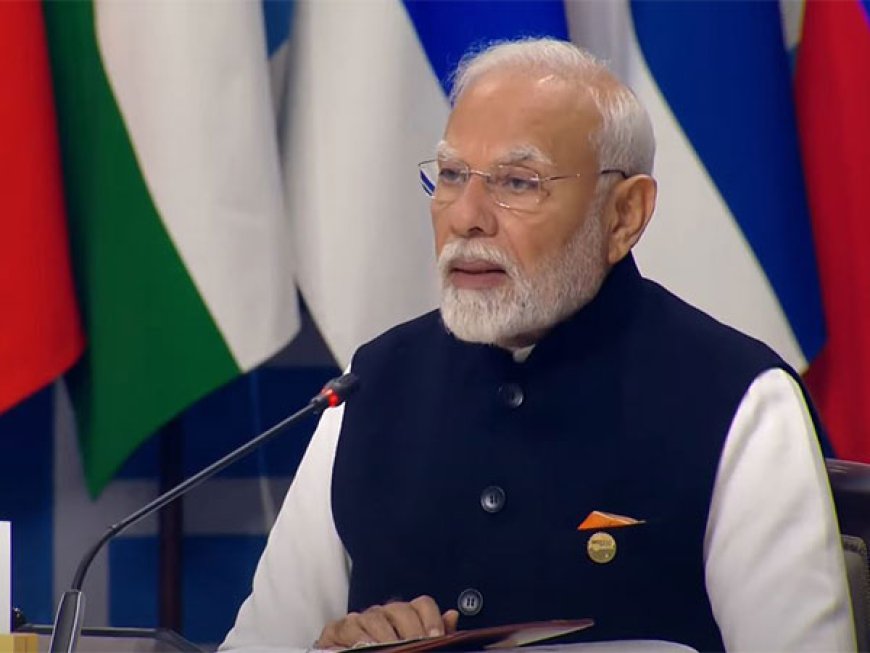PM Modi Calls for Global Safeguards on Critical Minerals and AI at BRICS Summit
At the BRICS 2025 Summit, Indian PM Narendra Modi stressed the need for protecting critical mineral resources, ensuring ethical AI governance, and enhancing the New Development Bank's global role.

RIO DE JANEIRO — JULY 7, 2025
In a strongly worded speech at the 17th BRICS Summit in Brazil, Indian Prime Minister Narendra Modi emphasized the urgent need for global safeguards on critical mineral supply chains and responsible governance of artificial intelligence. His remarks reflect India's growing assertiveness on global policy matters related to technology, trade, and economic independence, especially within the framework of a rapidly expanding BRICS alliance.
Speaking to an audience that included leaders from Brazil, Russia, China, South Africa, and several new BRICS entrants, Modi warned against the “weaponisation” of essential technologies and resources by powerful nations, a veiled reference to both Western and Eastern blocs seeking dominance in these sectors.
Critical Minerals: A Geopolitical Battleground
PM Modi was unequivocal in stating that critical minerals—such as lithium, cobalt, rare earth elements, and graphite—must remain accessible and free from geopolitical coercion.
“We must not allow any one country to dominate or weaponise access to these crucial resources,” Modi asserted. “Just as oil shaped the politics of the 20th century, critical minerals will determine the strategic calculus of the 21st.”
India, which imports a significant share of its lithium and cobalt for battery production, has been actively exploring domestic reserves and seeking mining partnerships in Africa, South America, and Australia. Modi’s address comes amid rising global concerns over China’s near-monopoly in the processing of rare earth elements.
The BRICS bloc, Modi suggested, must collaborate to:
-
Diversify mining investments
-
Promote joint research and sustainable extraction
-
Create a shared strategic reserve for critical minerals
-
Reduce dependence on any single supply chain chokepoint
Regulating Artificial Intelligence: A Call for Global Standards
In a session dedicated to technology and development, PM Modi urged fellow BRICS nations to take the lead in establishing ethical and responsible standards for artificial intelligence (AI).
“AI is a transformative tool, but it must not be left unregulated. It must serve humanity, not manipulate it,” he said.
Modi proposed the formation of a BRICS AI Governance Framework, which would:
-
Establish norms around data privacy, algorithmic transparency, and bias detection
-
Promote cross-border research collaboration
-
Encourage open-source platforms to ensure equitable access
-
Explore AI audits and regulatory sandboxes to prevent misuse
India has recently passed a draft AI regulation policy, focusing on safeguarding user rights and ensuring AI use in public services is both transparent and accountable. Modi’s BRICS proposal mirrors those national priorities and positions India as a global voice for AI ethics, especially as the world grapples with deepfakes, surveillance misuse, and job displacement fears.
Strengthening the New Development Bank (NDB)
PM Modi also highlighted the need to bolster the financial strength and credibility of the New Development Bank (NDB)—BRICS’ answer to the World Bank and IMF.
He proposed:
-
Increasing the capital base of the NDB
-
Expanding membership beyond BRICS
-
Creating local currency lending instruments
-
Launching climate finance and tech innovation funds
“The NDB must not just be a bank of the South. It should become a true development partner for all emerging economies,” Modi stated.
Currently headquartered in Shanghai, the NDB has funded over $35 billion in infrastructure and green energy projects but is still seen as limited in scale compared to Bretton Woods institutions. India’s push aligns with growing calls within BRICS to de-dollarize international transactions and use local currencies for cross-border lending.
A Delicate Balancing Act
PM Modi’s speech reflected a delicate diplomatic balance: on one hand, supporting BRICS’ call for a multipolar world order while on the other, preserving India’s independent foreign policy and economic pragmatism.
His remarks carefully avoided directly criticizing the United States, the European Union, or China, focusing instead on “collective resilience, technological cooperation, and economic justice.”
This approach allows India to:
-
Strengthen ties within BRICS
-
Attract global investments in its digital economy
-
Retain trade partnerships with Western economies
Global Reactions and Strategic Implications
Modi’s proposals received praise from several quarters of the BRICS summit:
-
South African President Cyril Ramaphosa echoed India’s stance on critical mineral equity, citing Africa’s untapped mining potential.
-
Brazil’s President Lula supported India's call for local currency lending, reiterating the need to reduce dependence on the U.S. dollar.
-
China’s delegation, while noncommittal on AI governance, expressed interest in joint research initiatives.
Outside the summit, think tanks and media in Washington and Brussels have taken note of Modi’s assertiveness. The Center for Strategic and International Studies (CSIS) in Washington called India’s stance on critical minerals “a clarion call for fairer global resource management.”
Conclusion: A Strategic Vision for the Future
PM Modi’s speech at the BRICS Summit may mark a defining moment in India’s global leadership role, particularly in framing the narrative around responsible tech development and fair resource access.
By urging collective safeguards on critical minerals, championing AI ethics, and proposing reforms to the New Development Bank, Modi signaled India’s readiness to shape—not just adapt to—the emerging global order.
As geopolitical rivalries intensify, India is positioning itself as a stabilizing force, advocating for equity, ethics, and multilateral cooperation in an increasingly fragmented world.











